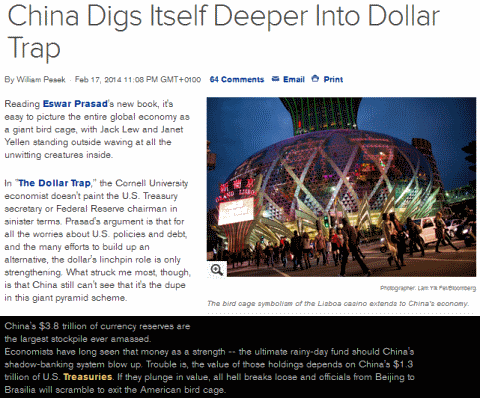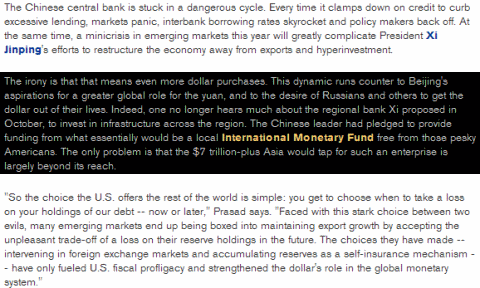Bloomberg bericht dat China Amerikaanse staatsobligaties heeft verkocht:
China, the largest foreign U.S. creditor, reduced holdings of U.S. Treasury debt in December by the most in two years as the Federal Reserve announced plans to slow asset purchases. The nation pared its position in U.S. government bonds by $47.8 billion, or 3.6 percent, to $1.27 trillion
Thi sis the largest decline since December 2011, according to U.S. Treasury Department data released yesterday. At the same time, international investors increased holdings by 1.4 percent, or by $78 billion, in December, pushing foreign holdings to a record $5.79 trillion.
Karel heeft er een mooi grafiekje bij:
Elders op Bloomberg (via @EddyElfenbein) lees ik echter een compléét ander verhaal. Ja en die streepjes zet ik niet voor niet op de e'tjes in compléét. De dollar heeft China aan het touwtje?! En hoe! Het is een boekbespreking. Hier deel 1...

Goed geraden, hier deel 2. U begrijpt vast wel waarom ik van sommige alinea's de kleurtjes heb omgedraaid:

Betonnen Waarheden
Ja, dat is even hele andere koek dan dat de dollar op zijn laatste benen wankelt, zoals u veel leest en misschien zelf ook wel denkt. Ik heb geen idee of het zo is of uitkomt, maar zelf ben ik altijd dol op verhalen die mijn Eigen Betonnen Waarheden volledig op hun kop zetten:
Niets is zo duur op als aan uw mening vasthouden, terwijl de markten de andere kant uitgaan. "Hé, jij zei toch dat huizen te duur zijn en nu koop je er zelf een!", krijg ik bijvoorbeeld te horen. Klopt, maar in mijn wijk zijn ze niet aan te slepen en dus verzilver ik de aanbieding van mijn woninbouwvereniging.
Terug naar China, Fed en dollar. Eigenlijk kijk ik niet eens zo raar op. Bijna wekelijks geef ik hem u ook en hang hem op een geel papiertje naast die andere ijzeren beurswet, die Don't fight the Fed luidt. Motto van de VS is: The dollar is our currency and your problem.
Bovenstaand verhaal past hier perfect in.